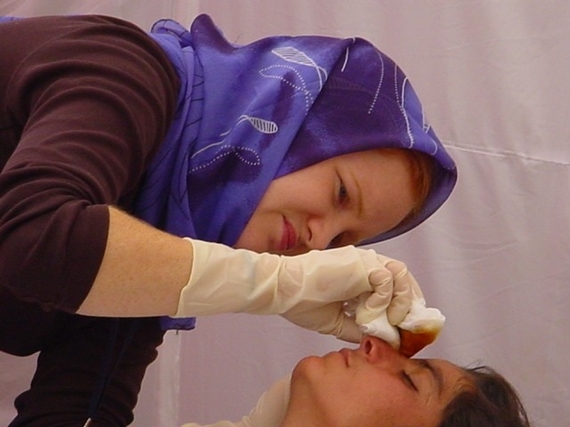BANGKOK - Experts are calling for increased protection to health care workers and patients in crisis situations in the face of growing attacks on health facilities, which challenge notions of their neutrality.

"We need multiple and reinforcing means to protect health care in situations of violence, including the well-developed mechanisms of human rights monitoring, reporting and accountability," Leonard Rubenstein, chair of Safeguarding Health in Conflict Coalition, a group of humanitarian and human rights organizations, told IRIN from the World Health Assembly, which is being held from 19 to 24 May in Geneva.
A 2014 report by the Safeguarding Health Coalition and Human Rights Watch documents attacks in 18 countries and claims that both the frequency and severity of violence against health care has increased in recent years -- including killings and torture of staff and damage to facilities and ambulances.
A resolution in 2012 by the World Health Assembly committed the UN World Health Organization (WHO) to "provide leadership at the global level in developing methods for systematic collection and dissemination of data on attacks on health facilities, health workers, health vehicles, and patients in complex humanitarian emergencies."
"We are pleased that, as part of its humanitarian reform initiative, the WHO is moving forward in providing global leadership in methods for systematic collection and dissemination of data on attacks on health facilities, health workers, health transports, and patients in complex humanitarian emergencies," Rubenstein.
Consultations with humanitarians and NGOs shaping the mechanism are ongoing. Activists and experts say a major impediment to combating increasing rates of violence against health care outlets is the lack of centralized data.
But experts say the picture is incomplete as many attacks go unreported and perpetrators are unnamed -- a fact which has curtailed effective responses to the violence. They point to the complexity of protection at the local level as an important consideration as global systems emerge.
According to Rudi Coninx, coordinator for emergency risk management and humanitarian action at WHO: "The objective of the central data collection methodology we are spearheading is first to document attacks and to have information about trends. And second, to act -- we need all actions taken against these horrific attacks to be based on evidence."
Hostilities and health
"Attacks against health workers and facilities undermine often already fragile health systems," said Joe Amon, health and human rights director at Human Rights Watch (HRW).
Ongoing conflicts around the world -- from Ukraine, to Yemen, to South Sudan -- have featured attacks on health care workers and facilities, and patients. On 29 April an attack on a health care centre in the Central African Republic, embroiled in a brutal internal armed conflict, left 22 civilians dead.
A 2013 report by the International Committee of the Red Cross (ICRC) revealed 1,809 attacks on health care outlets in 23 countries between January 2012 and December 2013: 91 percent of the incidents involved violence against health care workers. The report was compiled by 23 ICRC delegations based on interviews with hospital staff, and victims and witnesses of attacks.
Health providers and humanitarian actors have used a variety of protection methods.
For example, the humanitarian medical organization, Médecins Sans Frontières (MSF), has stationed armed guards at some of its facilities in Somalia - a tactic MSF officials admitted was "not ideal." Research in Myanmar suggests "community collectivity" strategies, in which attacks on health care are framed as affecting the population instead of individuals, are another violence aversion strategy. The ICRC has held confidential negotiations with attackers to curb ambulance attacks in Yemen.
Pierre Gentile, head of the Health Care In Danger project at ICRC, said: "There is no... one single recommendation that would change the landscape and provide safety for health care. There are a lot of measures that have been taken by stakeholders in various countries around the world to improve health care delivery."
Activists hope improved data collection will increase humanitarian and human rights actors' ability to react to violence by expanding the scope of protection methods for health care workers.
Doctors can't always be neutral
"The humanitarian value of neutrality is an important one but adherence to neutrality is not a predicate to the right to medical services without interference," explained Rubenstein, who works at the Centre for Public Health and Human Rights at Johns Hopkins University in the US.
In a 2013 article in the International Review of the Red Cross, he wrote: "Unlike humanitarian providers... local doctors, nurses and other health workers need not and often cannot be neutral - that is, they cannot refrain from 'taking sides in hostilities or engaging in controversies of a political, racial, religious, or other ideological nature'."
Studies have documented how health care workers in conflict areas develop coping mechanisms to continue their work, albeit with limited capacity to deliver much-needed services.
Experts say a human rights approach to protecting healthcare workers -- including dissenters, minorities and the marginalized who take sides in conflict -- is essential to supporting health care workers operating in tense situations.
"Different contexts will require different solutions, but it's important we have the best information possible so we can act together," argued WHO's Coninx.
Said Rubenstein: "Protection must begin by changing norms and expectations, so that it is no longer considered legitimate for states and armed groups to attack medical providers because they offer care to persons affiliated with a political opposition."
Speaking at this week's conference, Valerie Amos, UN under-secretary-general for humanitarian affairs and emergency relief coordinator, said: "We need to prioritize people`s health over political manoeuvring."
This post was originally published by IRIN.
